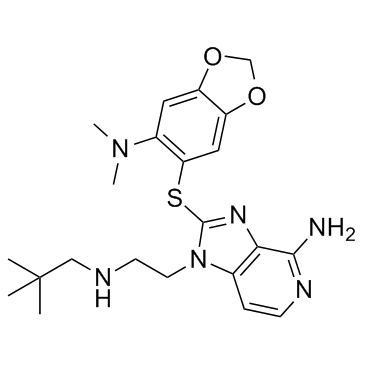| Description |
Debio 0932 is an orally active HSP90 inhibitor, with IC50s of 100 and 103 nM for HSP90α and HSP90β, respectively.
|
| Related Catalog |
|
| Target |
HSP90α:100 nM (IC50)
HSP90β:103 nM (IC50)
|
| In Vitro |
Debio 0932 is an orally active HSP90 inhibitor, with IC50s of 100 and 103 nM for HSP90α and HSP90β, respectively. Debio 0932 (CUDC-305) binds to the tumor HSP90 complex with a mean IC50 of 48.8 nM. Debio 0932 (1 μM) promotes degradation of multiple HSP90 client proteins in cancer cell lines. Debio 0932 also shows inhibitory activities against the proliferation of 40 cancer cell lines (containing 34 solid and 6 hematologic tumor-derived lines) with an IC50 ranging from 40 to 900 nM (mean IC50, 220 nM)[1]. Debio 0932 strongly binds to cancer-derived HSP90 complex with an IC50 of 61.2 nM in H1975 cells and 74.2 nM in H1993 cells, respectively. Debio 0932 (CUDC-305, 1 μM) durably induces oncoprotein degradation in NSCLC cell lines with mutations that can confer resistance to erlotinib[3].
|
| In Vivo |
Debio 0932 (CUDC-305, 30 mg/kg, p.o.) exhibits favorable pharmacokinetic profiles in tumor-bearing nude mice. Debio 0932 (160 mg/kg, p.o.) causes degradation of HSP90 client proteins, suppresses tumor growth, and also prolongs survival in various animal models of U87MG glioblastoma. Debio 0932 (40, 80, or 160 mg/kg, p.o.) also dose-dependently inhibits tumor growth in the U87MG s.c. tumor model by every-other-day (q2d) dosing[1]. Debio 0932 (80 mg/kg, p.o.) significantly alleviates psoriasis by day 11 and decreases epidermal thickness in psoriasis xenograft transplantation model[2]. Debio 0932 (CUDC-305) is able to cross the blood-brain barrier. Debio 0932 (80, 120, and 160 mg/kg, p.o.) shows dose-dependent inhibition of tumor growth in the H1975 subcutaneous tumor model. Debio 0932 (160 mg/kg, p.o.) also promotes antitumor activity in the erlotinib-resistant H1975 subcutaneous tumor model[3].
|
| Kinase Assay |
COOH terminal His-tagged human HSP90α and HSP90β proteins are expressed in Escherichia coli. Fluorescence polarization competition binding assays are done with purified HSP90α or HSP90β and FITC-labeled geldanamycin in the presence of different concentrations of test articles (Debio 0932). The final reaction contains 10 and 50 nM of labeled geldanamycin and purified HSP90 protein, respectively. The assay buffer contains 20 mM HEPES (pH 7.3), 50 mM KCl, 1 mM DTT, 50 mM MgCl2, 20 mM Na2MoO4, and 0.01% NP40 with 0.1 mg/mL bovine γ-globulin. Polarization degree (mP) values are determined using a Synergy II plate reader with background subtraction after 24 h of incubation at 4°C[1].
|
| Cell Assay |
Human cancer cell lines are plated at 5,000 to 10,000 per well in 96-well plates with culture medium. The cells are then incubated with compounds (Debio 0932) at various concentrations for 120 h. Growth inhibition is assessed by ATP content assay using the ATPlite kit. Briefly, a 25-μL cell lysis solution is added to the 50-μL phenol red-free culture medium per well to lyse cells and stabilize ATP. Then 25-μL substrate solutions are added to the wells, and subsequently, luminescence is measured with a TopCount liquid scintillation analyzer. Values are expressed as a percentage relative to those obtained in untreated controls. IC50 values are calculated using PRISM software with sigmoidal dose-response curve fitting[1].
|
| Animal Admin |
When tumors are established after implantation, animals with proper tumor size are randomly assigned into different groups. Debio 0932 is formulated in 30% Captisol and delivered by oral gavage based on the body weight of each individual animal. The control group is treated with vehicle (30% Captisol) using the same dosing paradigm. In combination studies, paclitaxel or camptothecin-11 is diluted in 0.9% normal saline and injected i.p. twice weekly[1].
|
| References |
[1]. Bao R, et al. CUDC-305, a novel synthetic HSP90 inhibitor with unique pharmacologic properties for cancer therapy. Clin Cancer Res. 2009 Jun 15;15(12):4046-57. [2]. Stenderup K, et al. Debio 0932, a new oral Hsp90 inhibitor, alleviates psoriasis in a xenograft transplantation model. Acta Derm Venereol. 2014 Nov;94(6):672-6. [3]. Bao R, et al. Targeting heat shock protein 90 with CUDC-305 overcomes erlotinib resistance in non-small cell lung cancer. Mol Cancer Ther. 2009 Dec;8(12):3296-306.
|
